“OCD and Childhood: How Early Environments Shape Repetitive Behaviors”
- caulocare
- Jun 7, 2025
- 3 min read

By Dr. Phumlarp Caulo, Doctor of Acupuncture and Chinese Medicine
The systematic recognition of obsessive-compulsive symptoms dates back to 19th-century European psychiatry. In 1838, French psychiatrist Jean Esquirol was the first to use the term “obsessions” to describe persistent, intrusive thoughts. He classified them under the broader psychiatric category of “monomania”, referring to an intense preoccupation with a single idea or behavior. Patients, in his observation, were trapped in recurring thoughts or compulsive actions that they could neither control nor suppress.
Later in the mid-19th century, German psychiatrist Karl Westphal expanded upon this understanding by introducing the term “Zwangsvorstellung”, meaning “compulsive idea”. Westphal shifted the interpretation away from delusion, suggesting instead that obsessive thoughts were related to disordered cognitive control rather than to psychosis.
In 1877, Westphal formally attributed these compulsive thoughts to dysfunction in intellectual processing and reasoning. His term Zwangsvorstellung laid the groundwork for what we now know as Obsessive-Compulsive Disorder (OCD).
🔬 1. Modern Medicine Perspective
🧠 Definition: OCD (Obsessive-Compulsive Disorder) is classified as an anxiety disorder, characterized by intrusive, repetitive thoughts (obsessions) and ritualistic behaviors (compulsions), such as repeated handwashing, checking locks, or excessive cleaning.
⚙️ Brain Mechanisms:
Dysfunction in the Orbitofrontal Cortex, Anterior Cingulate Cortex, and Basal Ganglia results in repetitive thought loops.
Abnormal levels of serotonin impair the brain’s ability to "shut down" intrusive thoughts.
🧬 Contributing Factors:
Genetics
Chronic stress
Childhood trauma or conditioning
Neurochemical imbalances (e.g., serotonin, dopamine)
🌿 2. Traditional Chinese Medicine (TCM) Perspective
In TCM, obsessive thinking and compulsive behavior arise from disharmony of the Heart and Spleen, causing the Shen (mind/spirit) to become disturbed.
🧠 Key Organs Involved:
Heart (心 – Xin):
The residence of Shen (spirit). When imbalanced, it leads to mental restlessness and obsession.
Spleen (脾 – Pi):
Governs thought and analytical thinking (Yi – 意). Spleen deficiency from overthinking disrupts Qi flow and leads to mental rumination.
Kidney (腎 – Shen):
Supports willpower and stores Jing. Kidney deficiency weakens inner resolve, making it hard to stop repetitive behaviors.
🔥 Related Emotional Patterns:
Overthinking
Anxiety and fear
Palpitations, insomnia, mental agitation
🧠 3. Psychological & Behavioral Perspective
💭 Root Understanding:
Obsessive behavior is the mind’s defensive mechanism to regain a sense of safety.
When uncertainty arises, the brain repeats thoughts/actions to self-soothe.
This behavior is a form of negative reinforcement—for example, handwashing relieves anxiety, so it becomes a repeated habit.
🧒 Developmental Patterns:
Individuals raised in controlling or high-stress environments may develop OCD-like behaviors as adults.
Suppressed emotions or unresolved trauma may also manifest as compulsions.
🛠 Approaches to Healing OCD-Like Symptoms
✅ 1. Modern Medical Treatment
SSRIs (e.g., Fluoxetine, Sertraline) to regulate serotonin
Cognitive Behavioral Therapy (CBT), especially Exposure and Response Prevention (ERP)
Establishing a structured, stress-reducing routine
✅ 2. TCM-Based Holistic Therapies
🪻 Acupuncture:
Effective points include:
Shenmen (HT7)
Yintang (EX-HN3)
Sanyinjiao (SP6)
Anmian (for sleep and calmness)
🍵 Chinese Herbal Formulas:
Tian Wang Bu Xin Dan (天王补心丹): Nourishes Heart Yin and calms the Shen
Gui Pi Tang (归脾汤): Strengthens the Spleen and Heart, reduces overthinking
Wen Dan Tang (温胆汤): Clears phlegm and harmonizes the mind
🧘♀️ Mind-Body Practices:
Qi Gong, breathwork, and heart-opening exercises help balance Qi and settle the Shen
✅ 3. Psychological Tools & Self-Healing
CBT + Mindfulness-Based Therapy: To bring awareness to obsessive loops
Journaling: To track triggers and patterns
Self-compassion practices: Reducing self-blame and internal criticism
Exploring the subconscious roots: Fear of failure, guilt, or unresolved emotional pain
🌟 Final Reflection from TCM:
“A stable Shen fears nothing. A strong Spleen does not cling to excess thought.”
Obsessive-compulsive symptoms are not a weakness, but a signal—a call for deeper harmony between body, brain, and spirit. By approaching it from both Eastern and Western perspectives, we can offer truly holistic care that helps individuals regain peace from within.
This information is only educational and should not be construed as medical advice.
Everything must be balanced, and the suggestions may not apply to you.
A specialist doctor should be consulted for any medical advice or diagnosis.
BOOK AN APPOINTMENT NOW!
Acupuncture near me at Forest Hill, NY
🔶🔷🔶🔷🔶🔷🔶🔷🔶🔷🔶🔷
Dr. Phumlarp Caulo LA,c, MAc. OM, DAHM
Doctor of Acupuncture/Chinese Medicine
Caulo Care Acupuncture
🔖 By appointment only
☎️+1 (929) 269-4549




Comments